Front Brake Flexible Hose -- Installation |
- HINT:
- Use the same procedures for the RH side and LH side.
- The procedures listed below are for the LH side.
| 1. INSTALL FRONT FLEXIBLE HOSE |
- NOTICE:
- When replacing both the left and right front flexible hoses, as the left and right hoses each have a different shape, be sure to check the part number to confirm whether the hose is the left or right one before installing it.
Connect the flexible hose with a new gasket and a new union bolt to the disc brake cylinder.
- Torque:
- 29 N*m{300 kgf*cm, 22 ft.*lbf}
- HINT:
- Install the flexible hose lock securely in the lock hole in the cylinder.
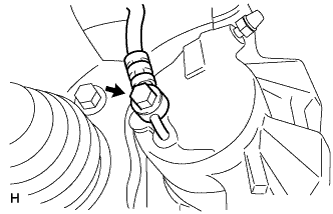 |
Set the flexible hose clamp on the flexible hose bracket.
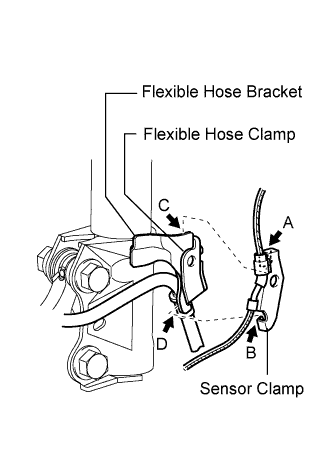 |
Simultaneously perform the following: 1) hang the hook part of the sensor clamp (labeled A) on the part of the flexible hose bracket (labeled C); and 2) insert the hook part of the sensor clamp (labeled B) to the part of the flexible hose bracket (labeled D).
Tighten the bolt (labeled C) to fix the flexible hose clamp and sensor clamp.
- Torque:
- 19 N*m{189 kgf*cm, 14 ft.*lbf}
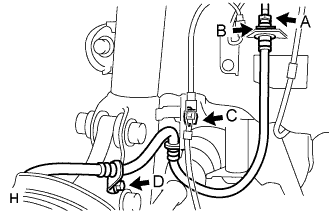 |
Install the flexible hose with the bolt (labeled D).
- Torque:
- 19 N*m{189 kgf*cm, 14 ft.*lbf}
Set the flexible hose to the connecting point with the brake tube (labeled A), and then attach a new clip (labeled B).
Using a union nut wrench, connect the flexible hose to the brake tube (labeled A) while holding the flexible hose with a wrench.
- Torque:
- without union nut wrench:
- 15 N*m{155 kgf*cm, 11 ft.*lbf}
- with union nut wrench:
- 14 N*m{145 kgf*cm, 10 ft.*lbf}
- HINT:
- Use a torque wrench with a fulcrum length of 300 mm (11.8 in.).
- This torque value is effective when the union nut wrench is parallel to the torque wrench.
- NOTICE:
- Do not bend or damage the brake tube.
- Do not allow any foreign matter such as dirt and dust to enter the brake tube from the connecting point.
| 2. FILL RESERVOIR WITH BRAKE FLUID |
- Fluid:
- SAE J1703 or FMVSS No. 116 DOT3
- NOTICE:
- Make sure there is sufficient brake fluid in the can.
- After adding braking fluid, make sure the reservoir is sufficiently full.
| 3. BLEED AIR FROM BRAKE MASTER CYLINDER |
- HINT:
- If the master cylinder has been disassembled or if the reservoir becomes empty, bleed air from the master cylinder.
Using a union nut wrench, disconnect the 2 brake lines from the master cylinder.
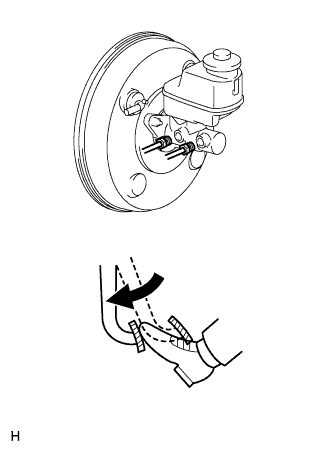 |
Slowly depress and hold the brake pedal.
Block the outer holes with your fingers, and release the pedal.
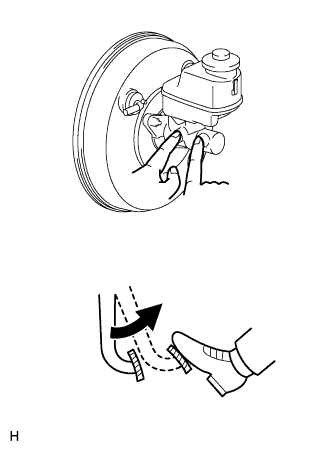 |
Repeat the 2 previous steps 3 or 4 times.
Using a union nut wrench, connect the 2 brake lines to the master cylinder.
- Torque:
- without union nut wrench:
- 15.2 N*m{155 kgf*cm, 11 ft.*lbf}
- with union nut wrench:
- 14 N*m{144 kgf*cm, 10 ft.*lbf}
- HINT:
- Use a torque wrench with a fulcrum length of 300 mm (11.8 in.).
- This torque value is effective when the union nut wrench is parallel to the torque wrench.
| 4. BLEED AIR FROM BRAKE LINE |

Remove the bleeder plug cap.
Connect the vinyl tube to the bleeder plugs.
Depress the brake pedal several times, and then loosen the bleeder plug with the pedal depressed.
When fluid stops coming out, immediately tighten the bleeder plug. Then release the pedal.
Repeat the 2 previous steps until all the air in the brake fluid is gone.
Tighten the bleeder plug.
- Torque:
- 8.3 N*m{85 kgf*cm, 73 in.*lbf}
Install the cap.
Bleed air from the brake line for each wheel by repeating the above procedures.
| 5. BLEED AIR FROM BRAKE ACTUATOR ASSEMBLY (w/ VSC) |
- NOTICE:
- After bleeding the air from the brake system, if the height or feel of the brake pedal cannot be obtained, perform air bleeding of the brake actuator with an intelligent tester by following the procedure below.
Depress the brake pedal more than 20 times with the engine off.
Connect the intelligent tester to the DLC3, and turn the ignition switch on (IG).
- NOTICE:
- Do not start the engine.
Select AIR BLEEDING on the intelligent tester.
- HINT:
- Refer to the intelligent tester operator's manual for further details.
Bleed the air out of the suction line.
- NOTICE:
- Perform the bleeding at the right front wheel and right rear wheel.
- Bleed the air by following the steps displayed on the intelligent tester.
Connect a vinyl tube to the bleeder plug at the right front wheel or the right rear wheel.
Loosen the bleeder plug.
Operate the brake actuator to bleed the air using the intelligent tester.
- NOTICE:
- Release the brake pedal at this time.
- HINT:
- This operation stops automatically after 4 seconds.
Check if the operation has stopped by referring to the intelligent tester display.
Temporarily tighten the bleeder plug.
Repeat the 4 previous steps until all air in the fluid is completely bled out.
Tighten the bleeder plug.
- Torque:
- 8.3 N*m{85 kgf*cm, 73 in.*lbf}
Repeat all of the above procedures for the right rear wheel to bleed the air out of the suction line.
Bleed the air out of the pressure reduction line.
- NOTICE:
- Perform the bleeding at the 4 wheels.
- Bleed the air by following the steps displayed on the intelligent tester.
Connect a vinyl tube to either one of the bleeder plugs.
Loosen the bleeder plug.
Using the intelligent tester, operate the brake actuator assembly, completely depress the brake pedal and hold it there.
- NOTICE:
- During this procedure, the pedal will feel heavy, but completely depress it so that the brake fluid comes out of the bleeder plug.
- Hold the brake pedal depressed. Do not depress and release the pedal repeatedly.
- HINT:
- The operation stops automatically after 4 seconds. When performing this procedure continuously, set an interval of at least 20 seconds.
Tighten the bleeder plug, then release the brake pedal.
Repeat the 3 previous steps until all air in the fluid is completely bled out.
Tighten the bleeder plug.
- Torque:
- 8.3 N*m{85 kgf*cm, 73 in.*lbf}
Repeat all of the above procedures for the other wheels to bleed the air out of the pressure reduction line.
| 6. BLEED AIR FROM CLUTCH LINE (for Manual Transaxle) |
Fill the brake reservoir with brake fluid and bleed the clutch system.
- Torque:
- 8.3 N*m{85 kgf*cm, 73 in.*lbf}
| 7. CHECK BRAKE FLUID LEVEL IN RESERVOIR |
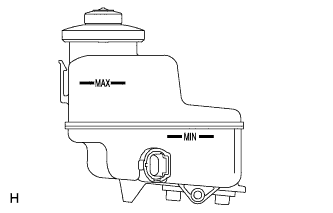 |
Check the fluid level and add fluid if necessary.
- Fluid:
- SAE J1703 or FMVSS No. 116 DOT3
- HINT:
- Add fluid to a level between the reservoir's MIN and MAX lines.
| 8. CHECK FOR BRAKE FLUID LEAKAGE |
| 9. INSTALL FRONT WHEEL |
- Torque:
- 103 N*m{1050 kgf*cm, 76 ft.*lbf}